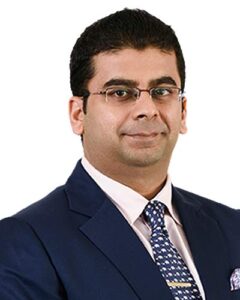Traditional family-run businesses are giving way to a new age of startups and technology-driven business models. Given India Inc’s desire for a global footprint, migration or foreign passports are now common. Many families and individuals move their wealth overseas or deploy funds through family offices (FO). Women have also been in the spotlight, given recent judgments advancing their rights of succession.

Partner and Co-Head of Private Client Practice
Cyril Amarchand Mangaldas
An Indian passport is seen as limiting these goals. The government does not allow dual citizenship and many business families and entrepreneurs have become global Indians. In the past five years, more than 600,000 Indians have surrendered their passports and obtained citizenship in friendly jurisdictions. Traditional destinations such as the US have been replaced by Portugal, Malta, Cyprus, Greece and other countries. Portugal’s Golden Visa programme and the permanent residency incentives offered by Cyprus and Greece are increasingly popular among high net-worth individuals. These pose challenges, as most who obtain such visas and passports continue to reside in India and maintain much of their wealth here. Sophisticated tax and governance mechanisms are needed to avoid adverse global tax consequences.
Many families wish to move large portions of their wealth overseas. India has an oppressive exchange control regime, with a low outward remittance limit of USD250,000 per year under the liberalised remittance scheme (LRS). Many are using the overseas direct investment (ODI) route to invest company funds overseas. The ODI limit is 400% of a company’s net worth. Setting up offshore FOs in places like Dubai or Singapore is also gaining traction.
Given the legal ambiguity surrounding such ODI structures and usage, the Reserve Bank of India (RBI) is keeping a close watch on such outflows. Recently, the RBI sought information on outward remittances from several entities, including FOs. The RBI’s 2021 draft ODI rules propose tightening overseas direct business investments and financial commitments. Investments through the LRS may need to comply with these rules, but there is no information on when the rules will come into effect, nor how they will be enforced.

Senior Associate
Cyril Amarchand Mangaldas
India has more than 200 formal FOs, handling the personal wealth of promoters. The wealthy, from serial entrepreneurs and next-generation scions to Bollywood stars, are keen to set up FOs to invest in startups and other targets. A survey of 103 FOs and ultra-high net-worth individuals in 2021 showed that direct startup investments and Indian equities, venture capital investments and developed market equities are the top three opportunities in the next three to five years. Such FOs are run by experienced M&A and investment professionals and rival traditional PE funds.
The trend of women as wealth creators is welcome. Women have become first-generation founders. Falguni Nayar, an investment banker turned entrepreneur, became the richest self-made woman in India after the debut in 2021 of FSN E-Commerce Ventures, the parent of her cosmetics and fashion retailer, Nykaa.
Courts have delivered landmark judgments upholding and advancing women’s rights, especially those applying to the succession and inheritance of Hindu women. In 2020, the Supreme Court held that daughters born before 2005 enjoy the same rights to the coparcenary, or joint inheritance or heirship, property as their male counterparts. As a coparcener, a daughter can seek partition of the property to claim her share and can sell or gift her interest to another coparcener or even a third party. Departing from the traditional view that a married daughter is part of her husband’s family and not that of her parents, in 2021 the same court held that a daughter continues to be a coparcener in her father’s Hindu undivided family (HUF) even after marriage.
In January 2022, the Supreme Court held that the self-acquired property of an intestate male Hindu devolves by inheritance and not by survivorship. In the absence of a widow and a son, his daughter inherits such property rather than his brothers and their sons.
The scope of private client advisory practice is constantly evolving, legally and culturally. With new clients such as startup founders and women entrepreneurs, changing laws and the blurring between M&A and private client practices, the space is exciting
and vibrant.
Rishabh Shroff is partner and co-head of the private client practice and Chirag Shah a senior associate at Cyril Amarchand Mangaldas.

Cyril Amarchand Mangaldas
Peninsula Chambers, Peninsula Corporate Park
Lower Parel
Mumbai 400 013, India
Contact details:
Tel: +91 22 2496 4455
Email: rishabh.shroff@cyrilshroff.com






















